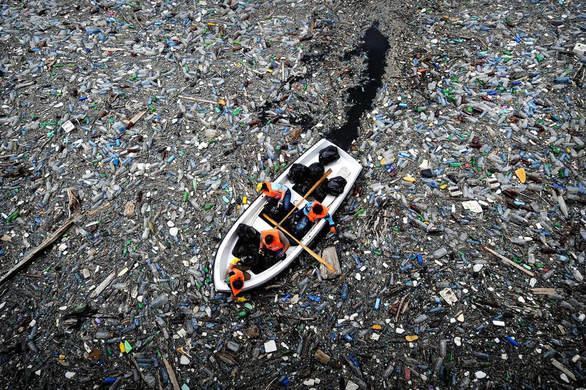|
Welcome to my life.
Typically, we don't think twice before picking up a plastic water bottle. We do not think of the consequences for the environment and our own health. We grow up thinking bottled water is the safest way of drinking water and that there is no harm done to our environment if we recycle. Recycling is good, but whether we recycle or not, the roots of our global plastic problem stay: Extraction, production, consumption, and yes, disposal. Most things are not so black and white, and neither is the global use of plastic water bottles. I only drink from a plastic water bottle if it is an emergency because I've been educated on the impact it makes. However from talking to friends about this subject I realized that most people aren't educated about the issue. SO...here is a basic rundown:
Extraction: Before taking a look at the consequences of the disposal of plastic water bottles, we must understand how they are created. The key ingredients in a plastic water bottle are PET, oil and water. One of the most environmentally problematic ingredients is oil. Just to put in perspective how much oil is extracted to produce these plastic bottles, it requires more than 17 million barrels of oil, not including the energy for transportation. ( pacinist.org ). The extraction of all of this oil is destructive to vegetation, animal migration routes, niches and even tourism. With the building of oil drilling sites comes seperation of animals and man made blockades within an ecosystem. This can alter predator and prey dynamics and increase animals getting hit by cars. Man made fencing and infrastructure not only disrupt an animals migration habits, but also threaten their survival. ( wilderness.org ). Finally, like most things, the extraction of oil contributes to climate change due to the fact that it releases methane. ( ghgonline.org ). Production: According to banthebottle.net , Americans use around 50 billion plastic water bottles a year which is approximately equivalent to over 100 billion liters (based upon the average measurement of a water bottle, which contains 16.9 fluid ounces). Yearly, we use 17 million barrels of oil, excluding the transportation to produce single-serve water bottles. Reflecting on the last paragraph about the damage caused by oil drilling, this is disasterous to our society and is a sustainable practice. According to BP’s annual report in 2014, oil reserves will only last us the next 53.3 years. This means, in theory, that currently we only have 50 years left of it. My generation, my childrens generation and even possibly my mothers generation will live to see the day where America has no more oil. The use of plastic water bottles shortens the time it takes for this country to get to that point. On average, it takes 3 liters of water to produce 1 liter of bottled water. (Pacinist.org). Not only does this production cost us water, but “every ton of PET produces around 3 tons of carbon dioxide” and “bottling water thus created more than 2.5 million tons of CO2 in 2006” according to pacinst.org. This shows that the extraction as well as production of bottled water leads to climate change with the emissions of greenhouse gases. Consumption: “A million plastic bottles are bought around the world every minute and the number will jump another 20% by 2021”. ( thegaurdian.com ). This number is astounding at first, but it makes sense when you really think about it. People visiting other countries don’t trust the water sometimes, so they buy bottled water. When you’re at a sports event or concert, you buy bottled water. When the water in your state or country is not safe to drink, you buy bottled water. In New York, considering we have some of the best water in the world, there is no excuse to buy water, however it is slightly more understandable in other places. People see plastic water bottles as the face of safe and clean, but how do we know that for a fact? BPA, a weak synthetic estrogen, is found in not only some water bottles, but also many other rigid plastics. These BPA’s can leach into your water as well as other harmful chemicals, especially if they are in a warm environment or directly heated up. (webmd.com). The effects if this BPA’s leaching into your water could be the disruption of hormone levels, cancer, and heart and behavioral problems. ( webmd.com ). BPA’s are a highly discussed concern within cancer research. According to breastcancer.org , because BPA acts as a hormone disruptor, they “effect how estrogen and other hormones act in the body, by blocking them or mimicking them, which throws off the body's hormonal balance”. This estrogen makes it easier for breast cancer to develop and grow. You would think that the FDA would immediately ban BPA’s after 2008, when their dangerous effects became more widely known, but unfortunately that did not happen. According to content.time.com , in 2012, “On March 30, the FDA announced that it was rejecting a petition from the Natural Resources Defense Council (NRDC) to ban BPA from food packaging”. Critiques speculate that more action will be taken to ban BPA’s once more research and education occurs. On a positive note, more people are buying reusable water bottles instead of single use ones. This may be because people are more environmentally aware or that reusable water bottles are becoming in style. TheGaurdian.com wrote an article about this phenomenon, saying “Think of it as the new tote bag: an instant way to signpost that you’re environmentally conscious, while also adding a Insta-friendly fashion statement to your everyday look” and “The trend is partly down to brands realising the power of the green pound”. BPA free reusable bottles are affordable as well, ranging from less than $4 to $50 (depending on how fashionable you would like your water bottle). Hopefully, this trend continues because this deceivingly small effort contributes to a better future for our earth. Disposal: People typically feel less guilty or not guilty at all for using plastic water bottles, because they plan to recycle them. However, this should not lift a weight off of ones shoulders because only one in five plastic bottles is actually recycled. ( globalcitizen.org ). The rest of these bottles are end up in landfills, where it takes 500 years to decompose and leak pollutants into soil and water. According to news.nationalgeographic.com , “8 million metric tons of plastic ends up in the oceans every year” and “The prediction that by mid-century, the oceans will contain more plastic waste than fish, ton for ton, has become one of the most-quoted statistics and a rallying cry to do something about it”. Though you should care about the endangerment of ocean animals and the pollution in our ocean, the will directly effect seafood eating humans as well. People assume that if there is no plastic in the fish that they are eating, it is safe to eat but that is not always the case. These chemicals ocean animals are digesting from contaminated water or plastic, whether it be oil, mercury, lead, pesticides or other toxins, are biomagnified down the food change and we end up eating contaminated seafood without even knowing. ( planetaid.org ). This all stems from not recycling plastic water bottles as well as other plastics. However, it is clear that even if you do recycle, there is a good chance your waste will end up in a landfill and later into our oceans. There are many reasons to use plastic water bottles but the reasons against using them are so much greater. You can chose not to use them because it is more cost effective. You can choose not to use them to keep our oceans clean. You can choose not to use them because you care about climate change. You can choose not to use them because you prefer to be stylish. You can choose not to use them for the sake of your health. You can choose not to use them because you care about the future of this planet. Or you can choose to use them because it is more convenient. It is up to you to decide whether your convenience is worth it. I know mine isn’t. Be apart of the conversation! Comment what you think!
4 Comments
5/25/2022 04:11:16 am
Plastic bottles will break down quicker and release harmful chemicals when filled with hot liquids. Thanks for the great article! Very well explained!
Reply
6/1/2022 03:17:07 am
There are many reasons to use plastic water bottles, but there are far more reasons to avoid them. You have the option of not using them because it is more cost effective. You have the option of not using them in order to keep our oceans clean.
Reply
6/6/2022 02:47:05 am
Excellent! There are many reasons to use plastic water bottles, but there are far more reasons to avoid them. You have the option of not using them because it is more cost effective.
Reply
7/13/2022 07:38:14 pm
The environmental harm caused by plastic water bottles has come to the public's attention more recently. Sadly, despite the fact that the majority of people are aware of the negative environmental effects of plastic water bottles, the usage of throwaway water bottles has not significantly decreased as a result of this knowledge. Even though recycling is easier than ever, 90 percent of plastic water bottles are not recycled after use, which results in billions of plastic bottles entering our landfills and even our seas each year. Americans consume an average of 50 billion plastic water bottles annually.
Reply
Leave a Reply. |
Caroline MeadeMaking noise through multiple mediums since 2001. Archives
May 2020
Categories |





 RSS Feed
RSS Feed
